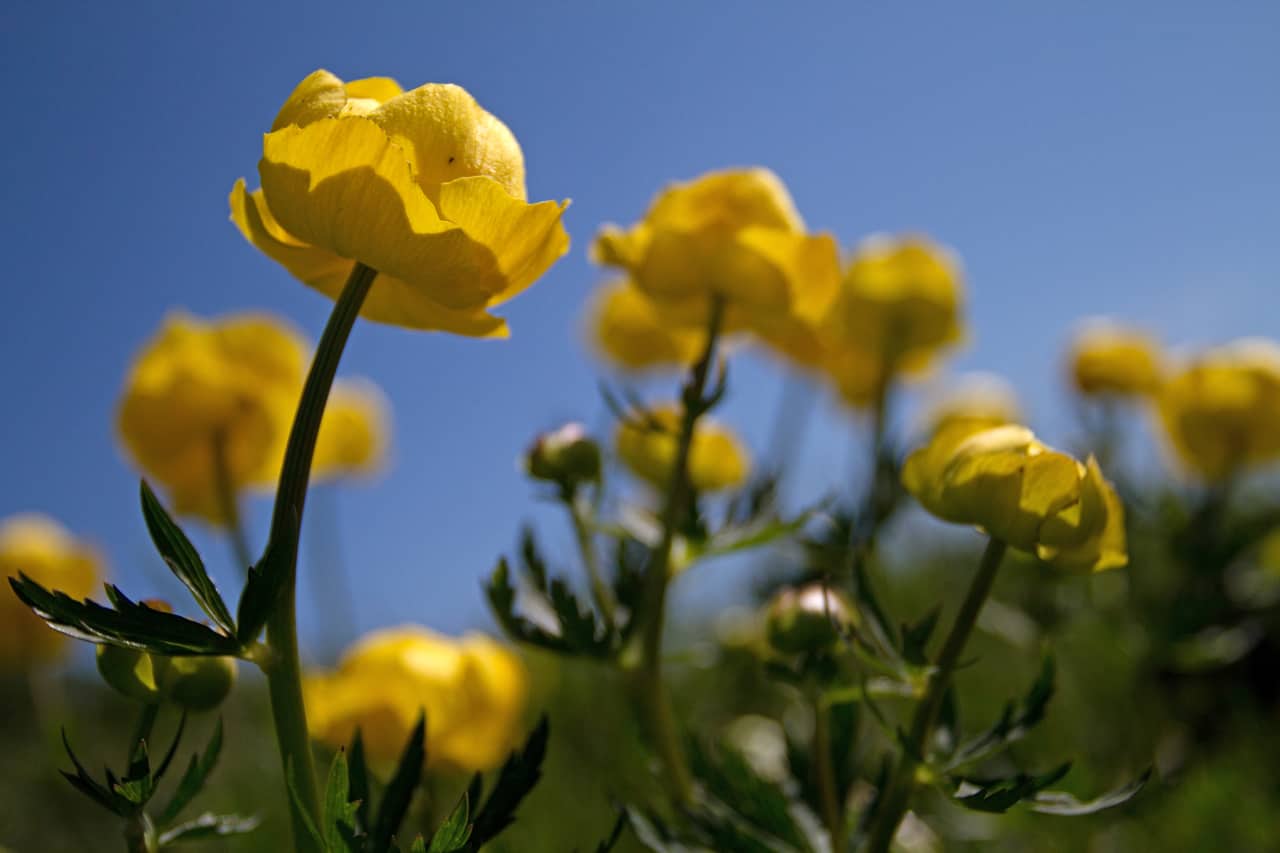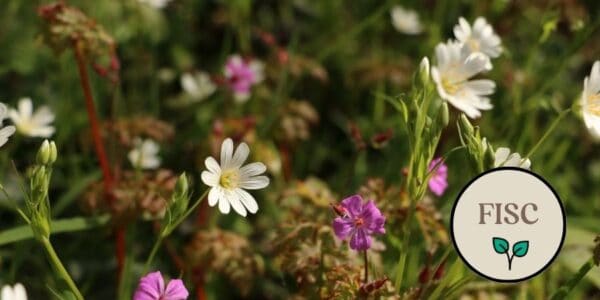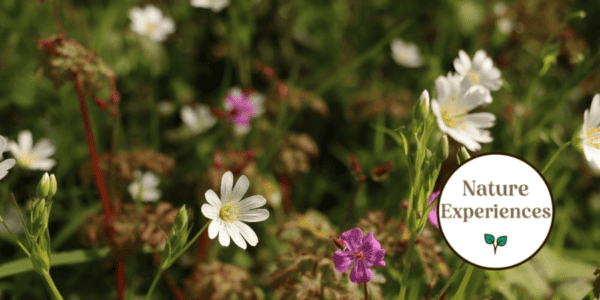Learn the key features of flowering plants and explore different habitats to uncover the variety of wildflower species specific to certain areas. Gain confidence, develop skills and learn how to use field identification guides and identification keys in this relaxed introduction to the world of botany.
Delve into the fascinating and beautiful world of botany! Plants are essential for all life on earth as they are the base of all terrestrial food chains.
This lively, informative, hands-on course offers complete beginners a relaxed introduction to the world of botany. With plenty of plant material to pull apart and look at in the classroom, we will investigate the vegetative (leaves, stems, roots) and reproductive (flowers, fruits and seeds) parts of flowering plants, and start to understand the roles that they perform. Moving outside, we will look at the plants growing around the field centre – using them for further study of these features. We will consider the domination of the angiosperms (flowering plants) in the broader context of the whole plant kingdom.
Your course takes place on a 12-hectare estate, surrounded by a rich range of habitats, including the River Severn and semi-ancient woodland, set in the heart of Shropshire with views disappearing into Wales.
PLEASE NOTE the course fee is for tuition only. There is no accommodation provided with this course. If you would like to book accommodation, lunch and an evening meal at FSC Preston Montford, please email [email protected]
Bookings will close if course capacity is reached
The course is for anyone interested in improving their ability to identify and understand the ecology of British wildflowers.
Who Should Attend?
Nature enthusiasts, Students, Early career ecologists, Citizen scientists, Volunteer surveyors, gardeners, general interest
Knowledge Level
Beginner. Level descriptors can be found on the following webpage: Framework and Course Level Descriptors
Prior Knowledge
A basic understanding of plants would be beneficial but no specific experience is needed for this course. Just a willingness to explore and learn.
This course will cover:
-
- An introduction to flowering plants
- Introducing vegetative parts
- Introducing flowering parts
- A basic overview of the evolution of flowering plants, and how they fit in the plant kingdom.
- Common species of grassland, hedgerow and wayside
By the end of the course, you will be able to:
-
- Label the most common vegetative features of plants needed for using botanical keys
- Describe the main (usual) functions of leaves, stems and roots
- Understand and explain the functions of the parts of a flower
- Describe the processes of pollination and fertilisation
- Describe the challenges that faced plants as they colonised the land
- Understand (at a basic level) how angiosperms reproduce
distinguish angiosperms from other plant groups - Share this knowledge with friends, family and fellow volunteers.
This is a place-based training course from FSC, including a balance of classroom-led learning to impart important knowledge and irreplaceable hands-on outdoor learning opportunities to give individuals skills and confidence. After attending this course, you may like to progress your learning within wildflowers with further relevant FSC courses or branch out into other areas of the plant kingdom. The FSC offers both online and in person courses, so you can choose the learning style that suits you best.
The course gives you the opportunity to immerse yourself in a new subject and acquire novel skills. Our fantastic tutor will combine the use of classroom-led learning and outside learning opportunities to give individuals the skills and confidence to learn more about wildflowers.
-
- See the ‘Example Timetable’ and ‘What’s Included’ sections below for more information about this course.
- Upon booking you will need to provide individual details of all attendees
- Please email [email protected] if you have any questions.
Group Bookings Made Easy
If you have a group of 10 or more individuals wanting to complete one of our courses, our team are available to discuss your options – from discounts to private team courses.
-
- Discounted rates
- Privately run courses for your group
- Bespoke courses developed specifically for your needs
Click here for more information!
If we are unable reach viable numbers for this course, we will inform you of the course cancellation 14 days prior to the course run. We would recommend when purchasing accommodation and/or travel you should take out your own insurance.
Tutor: Dr Karen Van Oostrum
Karen has a love of plants and the environment, and enjoys sharing this with others, through courses and guided walks. A Biology graduate of Oxford University with a Ph. D. in wheat genetics, Karen was Head of Education at Cambridge University Botanic Garden from 2006 – 2012 and has worked with people of many ages from diverse backgrounds. Self-employed since 2013, Karen writes and delivers introductory courses in Botany, hosts school visits at her local Field Studies Council Centre, and supports the teaching of plant science in Primary Schools through INSET and pupil workshops. Karen volunteers with her local environment group in the Chilterns, leading guided walks and overseeing work parties.Book with Confidence
We understand the difficulties of making plans in the current situation when guidelines continue to change, and insurance conditions are being tightened. In response, we will continue to offer additional flexibility. Find out more here
Example Timetable
Example Timetable
This timetable is subject to change but should give a clear outline of what to expect
-
- Please arrive in time for the course to start promptly at 10:00am
- The course will end at 5:00pm
Day 1
| 10:00am | Welcome, H&S, introductions, aims of the course |
| 10:15am | Classroom session covering:
|
| 11:30am | Break – refreshments not provided |
| 11:45am | Classroom session covering:
|
| 12:15pm | Field Session - identifying flowering/non-flowering plants, and monocot |
| 1:00pm | Lunch - not provided |
| 2:00pm | Classroom session covering:
|
| 3:30pm | Break and prepare for field session – refreshments not provided |
| 3:45pm | Field Session - looking at vegetative features |
| 4:30pm | Classroom plenary |
| 5:00pm | Finish |
Please note accommodation, refreshments and an evening meal are not included
Day 2
| 10:00am | Welcome, recap |
| 10:15am | Classroom session covering:
|
| 11:30am | Break – refreshments not provided |
| 11:45am | Classroom session covering:
|
| 12:15pm | Field Session - Looking at flowers and brief intro to using botanical keys |
| 1:00pm | Lunch - not provided |
| 2:00pm | Recap quiz and questions |
| 3:00pm | Break and prepare for field session – refreshments not provided |
| 3:15pm | Field Session - Opportunity to complete more practical work and develop skills, including further flower dissections, and identification activities outside |
| 4:30pm | Classroom plenary |
| 5:00pm | Finish |
What's Included
The course has been carefully created by expert tutors and educators to help you continue to build and develop your knowledge and apply it within the field surrounded by like-minded individuals.
The course includes:
- Classroom learning covering the theory of the species
- Field excursions to apply new knowledge
- Expert tuition for which the Field Studies Council is renowned
- Clear objectives and progression
You can rest assured that the absolute best content from an expert in environmental education will be provided. In choosing an FSC course, you will be joining thousands of people who learn with us each year.
Before You Attend
What to Bring:
-
- Notebook and pencil
- Camera to capture images
- Lunch and refreshments
- Sensible footwear and clothing for being outdoors
If you have them:
-
- Hand lens
- Your own reference book(s)
There will be a member of staff with first aid training and access to a first aid kit on site. If you have special medical or access requirements, please let us know as soon as possible so we can plan the course.
Sorry this course has ended



